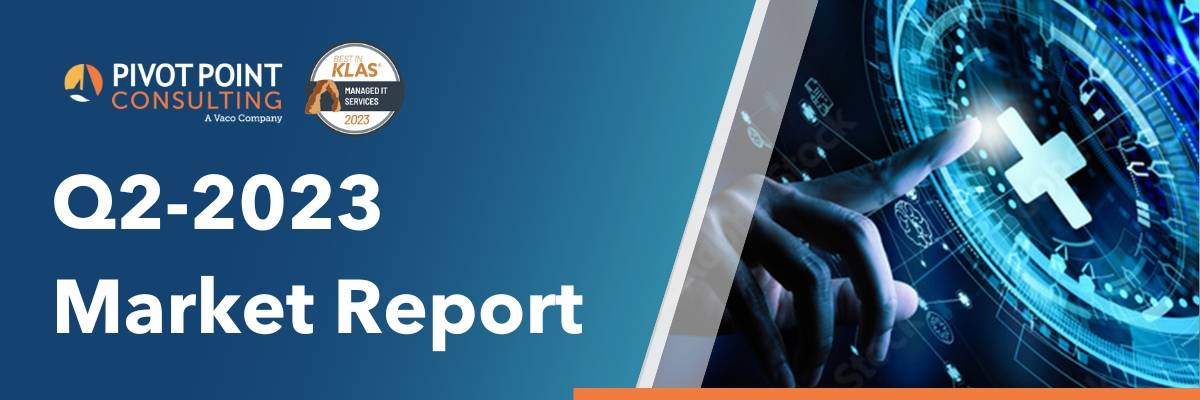Pivot Point Consulting Q2-2023 Healthcare IT Market Report
Data innovation, accelerating your data innovation journey, artificial intelligence and the end of the COVID-19 Public Health Emergency will define Q2-2023 in healthcare, according to Pivot Point Consulting’s latest quarterly market report.
NASHVILLE, Tenn., April 19, 2023 — Pivot Point Consulting, a Vaco Company and #1 Best in KLAS Managed IT Services provider, has released its Q2-2023 Market Report, covering emerging trends predicted to drive healthcare in the next quarter. This report provides insights and recommendations to help industry leaders frame strategies, drive innovation and operate efficiently in an unpredictable, rapidly evolving environment. The full report is available for download here.
“Our quarterly market report highlights the powerful forces that are reshaping the healthcare landscape, including healthcare costs, consumer convenience, patient empowerment, emerging technologies and more,” said Pivot Point Consulting VP of Data & Analytics-AI, Ryan Sousa. “As healthcare leaders, our work emphasizes data innovation’s remarkable capacity to improve patient care, advance research, streamline operations and enrich workforce experience. This critical juncture offers providers the ticket to embark on a journey to accelerate data innovation and help people live healthier lives.”.
The Pivot Point Consulting Q2-2023 Healthcare IT Market Report focuses on seven key trends predicted to drive healthcare decision making in a market undergoing rapid digital transformation, with insights ranging from the potential impact of artificial intelligence (AI) on the healthcare experience to the end of the COVID-19 Public Health Emergency. This report provides key insights for healthcare providers looking to adapt and thrive in an increasingly competitive and turbulent market.
Highlights from this quarter’s report include:
- Accelerating Your Data Innovation Journey Series: Data innovation has the potential to transform healthcare by improving patient care, reducing costs, and making the healthcare system more efficient. However, to realize this potential, healthcare organizations need to completely rethink their delivery model.
- AI Interventions to Quench Burnout: Clinician burnout is a pressing issue that impacts healthcare providers worldwide. While electronic health record (EHR) systems have existing organizational functionality to help address some underlying causes of burnout, advances in technology are expected to progress rapidly. AI offers four specific and practical applications that can help tackle the rising problem of clinician burnout.
- The Retail Health Chess Game: In the past six months, the big four healthcare retailers have made bold opening moves, with over $30B in healthcare acquisitions to rapidly expand their physical and geographic footprint and scope of services. If these strategies are well executed, the big four healthcare retailers will transition from mere disruptors to transformative forces in healthcare delivery – achieving this in a matter of years, not decades.
- How ERP Systems Can Help with the Nursing Staffing Shortage: With the healthcare industry expecting a shortage of 250k-400k nurses by 2025, the nursing shortage not only impacts patient care, but also has major financial implications. Human resource information systems (HRISs) and enterprise resource planning (ERP) systems offer a powerful solution to this crisis.
- Public Health Emergency Ends: Changing How We Deliver Care…Again: On May 11, 2023, the COVID-19 Public Health Emergency will end. Numerous programs and allowances that increased access to healthcare and insurance, and increased reimbursements for health providers, will end. It is essential to understand the implications for operations and revenue capture.
- The Future of Managing IT Departments: Doing Even More With Even Less: Health systems are struggling to attract and retain top IT talent. High turnover rates and costs associated with recruiting and hiring further exacerbate these challenges. Managed services offers a cost-effective, scalable solution that alleviate the burden on IT staff and help healthcare systems focus on strategic priorities and patient care.
- The Life Sciences Revolution – Doing More Together with Provider Partnership: The pandemic has highlighted the value of collaboration between life sciences organizations, EHR vendors and healthcare providers, leading to the accelerated adoption of advanced technologies and best practices. Increasingly innovative solutions that leverage analytics, clinical best practices and workflow design are being developed to improve patient care.
About Pivot Point Consulting
Pivot Point Consulting enables healthcare organizations to realize the most value from their technology and resources through Managed Services, Data & Analytics, EHR, ERP, Advisory, Virtual Care and Cybersecurity services. Its award-winning industry experts deliver Consulting, Managed Services and Talent Solutions to providers, payers, life sciences and technology organizations. The firm is currently ranked #1 Best in KLAS: Managed IT Services and has been repeatedly recognized as a top performer by KLAS in multiple categories, including #2 Best in KLAS: Partial IT Outsourcing (renamed Managed IT Services in 2023) and Best in KLAS: Overall IT Services Firm in 2022 and #1 Best in KLAS: Overall IT Services Firm in 2020.
For more information, visit pivotpointconsulting.com.
For Media Inquiries:
Brittney Kowalski
(603) 504-2024
bkowalski@vaco.com


